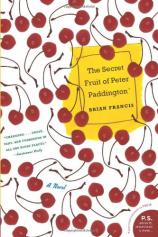Reading Group Guide
Discussion Questions
The Secret Fruit of Peter Paddington: A Novel

1. What do you make of Peter's talking nipples? If you read this as a metaphor, what does it signify, and why nipples as opposed to some other body part? The things that the nipples say sometimes seem almost abusive. Are Peter's nipples expressing something that Peter himself really wants to say, or is it not quite that simple?
2. As Peter goes through his awakening process, both of his older sisters are losing weight and changing their lives. Does this have a direct effect on Peter? How do the members of this family challenge each other? Why is the issue of weight so sensitive and difficult for them? How does the weight become both a bond and an obstacle between them?
3. How does Francis portray the character of Peter's mother? She can easily be seen as terribly neurotic, even obstructive to her children's health and happiness. Is it possible to see her in a more sympathetic light? Does Francis provide ways for the reader to do that? Might it be wrong to blame her for this family's problems?
4. Peter's "bedtime movies" provide some of the most poignant and funny moments in the novel. How do these moments function in Peter's growing awareness of who he is and who he is not? What do they tell us about him, aside from the fact that he seems to be gay? When he imagines these scenes and casts them with people he knows, what sorts of things is he feeling as well as desire?
5. When faced with one of the biggest gender hurdles of adolescence – the choice between "Shop" and "Home Ec." in school -- Peter forces himself to choose not what he wants, but what he believes is normal. "I tried to get myself excited as I handed in my form on the last day of 7th grade. It had taken me a good ten minutes to make a red circle around the word "Shop." 'Peter, this is your last chance to be normal,' I told myself. 'Who knows? Maybe you'll even make a boyfriend. You can do it!'" (Page 63.) For Peter, as for so many young people, the attempt to "be normal" means going against who they really are. What is it that keeps this system in place? How is it internalized? Does Peter learn to distrust this definition of "normal?"
6. What role does Peter's father play in this family? Is Peter able to identify with his father at all? Why or why not?
7. On page 67, Francis begins a very funny and accurate description of the different identity groups at Peter's school. There is the Athlete group, the Short group, the Geek group, the Goody-Goody group, the Indian group, the Slut group, the Banger group. And then there are the people who don't fit into any group. Peter sees himself as such a loner that he doesn't even belong to this final group of misfits. Why is it so important to Peter that he find a group that will accept him? Were you part of a group in your school at this age? Which one? How did you feel about it?
8. Why does Peter have trouble understanding that Daniela is his friend? Is the problem that she is a girl, or that she comes from a family more troubled than his own, or that she too is a misfit? Or is it something to do with Peter's idea of himself? What is it that allows Peter to realize that he cares about Daniela as a real friend after all?
9. Why is the character of Uncle Ed so important in this story? Why are Peter's feelings about his uncle so conflicted? In what ways is Peter like Uncle Ed, and in what ways is he different? Do you find Uncle Ed disturbing? Is he sympathetic in any way?
10. At the end of the novel, in "Bedtime Movie #6," Peter feels himself to be running from something. "It's bigger, faster, and darker and it's something that I know already, something that I try not to think about too often. It's been following me for a long time now. And if I stop for one second to look behind me, it will trip me and ruin everything. So I don't look behind and I don't stop running." (Page 276) Why does Peter feel that the truth will ruin everything? Peter is running from the knowledge that he is gay, which he already knows. But what else is there to run from? What else might he not want to acknowledge about his life? What impact might these acknowledgements have on his identity and his life?
The Secret Fruit of Peter Paddington: A Novel
- Publication Date: August 2, 2005
- Paperback: 276 pages
- Publisher: Harper Perennial
- ISBN-10: 0060792442
- ISBN-13: 9780060792442






